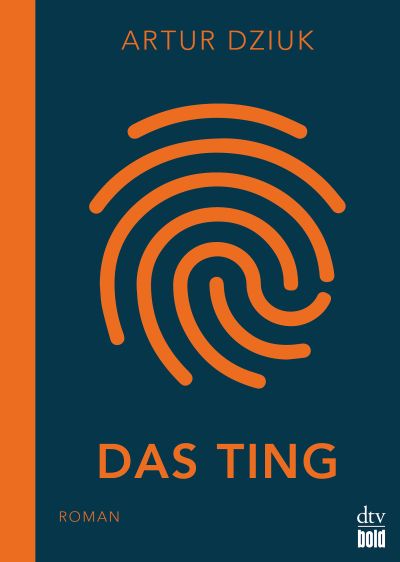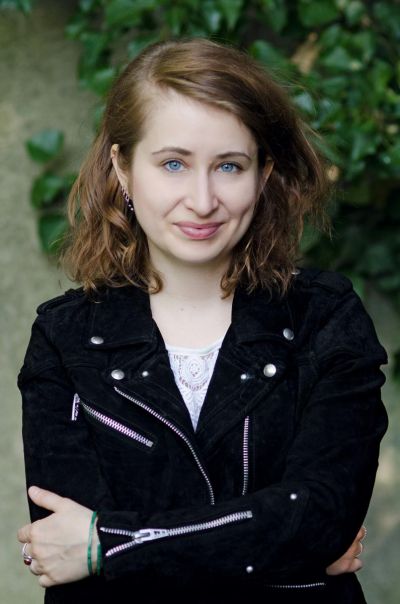Artur Dziuk

When Dziuk’s parents came to Germany from socialist Poland, where they had few prospects, his mother was 22 and his father 27 years old. Instead of their old jobs (teacher and auto mechanic), they began their lives in West Berlin with cleaning jobs and German courses. They were too busy with their integration to have more children; at least that’s how Artur Dziuk, who grew up without siblings, sees it in retrospect. Eventually, his father joined the Daimler production line, where today he works in a research department. His mother also carved out a career for herself: she trained to be an assistant tax consultant, studied business administration at night school, and is now a tax consultant with her own firm. Art and culture played no role in Dziuk’s parental home. He never saw his parents read any books. He, too, read very little in his youth. He was, however, an avid consumer of television series and video games and developed a fascination for stories and effective narrative techniques at an early age.
Then – towards the end of Dziuk’s adolescence – he experienced a transformation. Almost overnight, he became someone who read a lot and wrote regularly. Dziuk saw this as a chance to develop his own personality away from his parents and to avoid conforming to the cliché of the Polish immigrant: industrious, inconspicuous to the point of invisibility, and completely assimilated.
His love of reading awoke immediately after graduating from high school. Now literature was no longer subjected to the interpretation and evaluation constraints of German and English lessons. A new freedom emerged. His aunt was a role model for him. “I often visited her in Poland”, says Dziuk. “She read an incredible amount, and that impressed me even as a child.” The new passion developed almost into an obsession in Dziuk’s eyes: “As if I had to catch up on something.” Among Polish authors, he was initially captivated by Stanisław Lem, then Witold Gombrowicz, of whom he says: “It’s just impossible to read Gombrowicz and not relate to the texts.”
At the same time as Artur Dziuk developed from an infrequent to a prolific reader, he began to write down words, observations and thoughts in a notebook that he always carried with him. Taking a playful approach, he turned these notes into miniatures and short stories. One day, Dziuk realised that writing had become an integral part of his existence, in his words “a practice that is part of everyday life”.
His topics are usually contemporary phenomena that he cannot properly categorise and explain, which is precisely why he is unable to let go of them. He says: “For me, storytelling is a way of approaching such mysteries and finding a language for my questions.”
Artur Dziuk takes his own writing seriously from the very start, even if he occasionally views it from a different perspective and quite self-deprecatingly as a somewhat vain endeavour. He pursues a goal, albeit with detours: in 2008, Dziuk was awarded one of the coveted places on the Literary Writing programme at the University of Hildesheim. Before that, he had spent a year in a Japanese studies programme and then studied prehistory and early history up to Bachelor level. Dziuk was extremely active in the Hildesheim literary world. He was co-editor of Bella Triste, a magazine “for young literature” that enjoys considerable respect in the literary world, and became one of the artistic directors of Prosanova, a literature festival known throughout Germany. After six years, he completed his studies with a Master of Arts. The author describes his time in Hildesheim as very enriching: “Although writing may not have been the main thing I learnt there, being in a literary ecosystem around the clock made me think a lot about literature. And I spent more time talking about writing than ever before or since in my life.” Sometimes this motivated him, sometimes it inhibited him, but overall it was a very important period of his life, in which he was able to reflect thoroughly on his own work, develop an aesthetic practice, and respect himself as an author. In Hildesheim, Dziuk also embarked on his first major novel project. He continued working on it after graduating, financed by residency scholarships that took him to places such as Schöppingen and the Künstlerhaus Eckernförde. Eventually, he moved to Berlin for two years and finished his novel there. By this point, Dziuk had gained a name for himself in literary circles, not least because of his participation in the “Open Mike” literary competition. And he was lucky enough to get a literary agency interested in his project. Nevertheless, it was anything but easy to find a publisher for his novel, which, in Dziuk’s words, “sits between two chairs”. Eventually, he was offered a book contract with a renowned publisher: dtv bold belongs to the long-established dtv publishing house and is geared towards a young target group, which in Dziuk’s eyes suits ‘Das Ting’ very well.
The novel is about an optimisation app, the “Ting”. It helps its users with all kinds of life decisions, big and small. The app is connected to the user’s body via sensors and collects data on hormone levels, heart rate and body temperature. At the same time, it can scan the environment and access all the information on the Internet. The Ting is constantly learning and is designed to help its users identify and follow the best courses of action. And the app does this rather persistently. Linus, the inventor of the Ting, eventually realises this, too. Together with his fellow student Adam, who has Polish roots, the hacker Niu and the entrepreneur’s son Kasper, who has a background in business administration, he founds a start-up. At the same time, the Ting steadily gains more and more power over everyone involved. Because: to be able to market the app convincingly, they have to believe in it.
Artur Dziuk researched the start-up scene for his novel. He read and conducted interviews with founders and came across a frequently recurring motif: the idea of being able to update oneself into the best version of oneself. The book was largely very well received. Deutschlandfunk radio reviewed “Das Ting” as a thought-provoking, entertaining and exciting novel, NDR’s Kulturspiegel spoke of a “successful debut” and the Tagesspiegel newspaper praised Dziuk for “elegantly blending science fiction and business thriller” in his novel.
Dziuk intends to explore a completely different topic in his next project, and is also looking for a new narrative style. The author believes that every topic demands a distinct language: “I want to be stylistically versatile and capable of learning so that I can get as close to the topic as possible.” In addition to Gombrowicz and Lem, his influences include American novelists such as DeLillo, Pynchon, David Foster Wallace and British writer Zadie Smith. But Dziuk also admires contemporary Polish authors such as Olga Tokarczuk and Szczepan Twardoch. Among German-language writers, he cites Kehlmann and Ernst-Wilhelm Händler in particular.
Dziuk is irritated when he is labelled a “Polish author”: “I may have been born in Poland and I stand by my heritage. But I think, dream, speak, and write in German.” Nevertheless, Dziuk does not want to be called a “German author” either, because he also considers this term to be an unacceptable simplification. He wonders what is gained by categorising people as “German” or “Polish”, as he feels that this does not tell people anything about him and just invites stereotypes. “If there has to be a national label”, says Dziuk, “then Polish-German author.”
Asked about his Polish homeland, Dziuk says: “Unfortunately, I know too little about it. As a child and teenager, my relationship with Poland was somewhat clouded.” In contrast to wealthy West Berlin, the crumbling Polish industrial landscape and rising poverty had a depressing effect on the young Dziuk. He was also greeted by other children with “The Kraut is here”, whereas in Germany he sometimes had to listen to jokes about Poles. “While I tried to be as German as possible as a child in Berlin, I neglected my Polish heritage”, says the author. In addition to his new novel, about which Dziuk does not yet want to reveal anything, he has another project in the pipeline: a longer stay in Poland to get to know the country of his birth and his family better.
Anselm Neft, August 2020
The author’s homepage: www.arturdziuk.de



